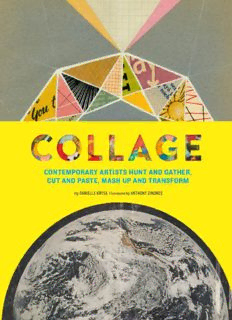
Collage Contemporary Artists Hunt and Gather, Cut and Paste, Mash Up and Transform PDF
Preview Collage Contemporary Artists Hunt and Gather, Cut and Paste, Mash Up and Transform
Copyright © 2014 by Danielle Krysa. Foreword copyright © 2014 by Anthony Zinonos. Artist statements, bios, and artwork copyright © by the individual artists. All rights reserved. No part of this book may be reproduced in any form without written permission from the publisher. Page 176 constitutes a continuation of the copyright page. Library of Congress Cataloging-in-Publication Data available. ISBN: 978-1-4521-2480-3 (pb) ISBN: 978-1-45213035-4 (epub, mobi) Design by Kristen Hewitt Chronicle Books LLC 680 Second Street San Francisco, CA 94107 www.chroniclebooks.com CONTENTS FOREWORD by Anthony Zinonos 7 INTRODUCTION by Danielle Krysa 10 THE CHALLENGE 13 LARISSA HAILY AGUADO 17 MARÍA APARICIO PUENTES 20 MARK BRADLEY-SHOUP 27 HOLLIE CHASTAIN 30 LISA CONGDON 34 MATTHEW CRAVEN 39 ANDREA D’AQUINO 44 KATRIEN DE BLAUWER 51 JESSE DRAXLER 56 HOLLY GABORIAULT 63 CLEMENS HABICHT 66 BETH HOECKEL 73 MICOSCH HOLLAND 78 JP KING 85 KHÁNH H. LÊ 88 KATHRYN MACNAUGHTON 93 PETER MADDEN 98 ARIS MOORE 105 VINCENT PACHECO 108 FRANCISCA PAGEO 113 LILLIANNA PEREIRA 118 CIARA PHELAN 125 MAHMOOD POPAL 128 JOSE ROMUSSI 133 ADRIENNE SLANE 138 XOCHI SOLIS 145 FABIEN SOUCHE 148 BRANDI STRICKLAND 153 BILL ZINDEL 158 ANTHONY ZINONOS 165 ARTIST BIOS 168 IMAGE CREDITS 176 FOREWORD BY ANTHONY ZINONOS The very first collage I remember making was a ransom note to my parents. The note read: “We have your children—send £2,500,000.” My sister and I never did receive that money. We hid in the back garden for a few hours until we got bored and hungry, then returned to the house acting as though nothing had happened. This has stuck in my memory, not just because of the unimaginable things the ten-year-old me planned to do with my share of money, but also because the process of leafing through stacks of magazines and newspapers trying to find the correct letters to make the note got me hooked. I have always been drawn to process-heavy art making, spending hours in darkrooms printing photographs, prepping silk screens and plates for printing or working on sheet after sheet of a great big pile of papers to later capture and make an animation that lasts for only twenty-five seconds. The obsessive-compulsive side of me—the side that likes order and organization —grabbed onto the medium of collage and ran for the hills. I discovered that the constant searching for and collecting of new materials to use, and the numerous hours spent trying to sort and arrange cut images, had my name written all over it. Over the last few years it seems that a “collage boom” has been taking place, a rise in popularity that has led not just to an increase in people making collage but to an influx of exhibitions, books, and blogs showcasing the diversity of the medium. Collage is earning a well overdue level of respect as a legitimate art form, instead of being thought of as just something for children to dabble with in their early school years. The basic idea of an artist needing to draw, paint, or sculpt is thrown out the window, and the scissors, scalpel, and glue are welcomed with open arms. I feel very lucky to be a part of this expansion in collage’s popularity. It has given me the opportunity to take part in exhibitions throughout the world— showing my work in small cities like Norwich in the United Kingdom, to more exotic metropolises such as Quito, the capital of Ecuador. It has also helped me to achieve commercial success as a collage illustrator. I could not be happier making collages for a living. It enables me to do the work I love every day of the week. Before the current renaissance, my own collage process was slightly frowned upon by my tutors and peers during my art school years. Only after graduating did I discover the tight-knit family of other collage artists that was flourishing online. These artists provided inspiration and encouragement and were always willing to share their process tips, methods, and work. There is something about collage that breeds collaboration. Indeed, it seems to be the perfect medium for collaborative projects. Working together with other collage practitioners opens the artist’s eyes to the different processes and methods employed by others and teaches the individual about his or her own work, and how it is read and perceived by others. theKAMIKAZEbarons, 2012, collage on paper We currently live in a very digital society, spending most of our day attached to a computer, tablet, or smartphone, navigating through virtual pages with a click of a button or the swipe of a finger. This may be one reason for the recent surge in popularity of collage and other forms of craft. It may be that people feel the need to make things by hand again, to physically touch and create something outside of their day-to-day digital lives. Mass-produced goods can be perceived as somewhat heartless and ordinary, whereas the satisfaction of creating something with one’s own hands is priceless. There is more room for error and this so often leads to unexpected, but frequently beautiful, mistakes. These mistakes can and should be embraced, because they often give rise to new ideas and therefore encourage progression in the work. I love collage because it is such a tactile process. I feel a connection to the materials that I’m using through handling and manipulating, and enjoy making them my own. The restrictions of working with collage materials is,
Description: